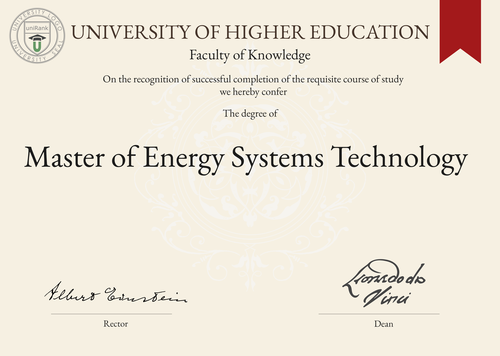
Master of Energy Systems Technology (MEST)
Guide to Master of Energy Systems Technology Program/Course/Degree
Master of Energy Systems Technology (MEST)

Program Name:
Master of Energy Systems TechnologyProgram or Degree abbreviation:
MESTDuration range:
The duration of the program typically ranges from 1 to 2 years.Tuition range:
The tuition fees for the program vary depending on the chosen country and university. It is recommended to check with specific institutions for accurate information.Overview:
The Master of Energy Systems Technology program is designed to provide students with a comprehensive understanding of energy systems and technologies. It focuses on the development, management and optimization of sustainable energy systems.Curriculum Overview by year:
The curriculum is structured to cover various aspects of energy systems technology. In the first year, students typically study foundational courses such as energy management, renewable energy technologies and energy policy. The second year often includes advanced courses in energy economics, energy storage and energy efficiency.Key Components:
The key components of the program include gaining knowledge in energy systems analysis, renewable energy technologies, energy policy and regulation, energy economics and energy management. Students also have the opportunity to engage in practical projects and research.Career Prospects:
Graduates of the Master of Energy Systems Technology program can pursue careers in various sectors, including renewable energy companies, energy consulting firms, government agencies, research institutions and utility companies. They can work as energy analysts, project managers, energy consultants, sustainability managers, or policy advisors.Salary Expectations:
Salary expectations for graduates of the program can vary depending on factors such as location, industry and job position. Generally, professionals in the energy systems technology field earn competitive salaries, with potential for growth and advancement. For a more accurate understanding of salary expectations, you can utilize the Job Sites Search Engine, from our sister site jobRank, which searches over 4,600 job sites worldwide. Make sure to specify not only the job title but also the country you are interested in.Conclusions:
It is important to note that the duration, tuition fees, curriculum, key components, career prospects and salary expectations of the Master of Energy Systems Technology program can vary based on the chosen country or location for studying the program, as well as the specific university offering the program. Prospective students are advised to research and compare different options to find the best fit for their goals and preferences. Furthermore, visitors interested in pursuing this specific degree (MEST) can utilize the uniRank World Universities Search Engine to search for universities offering the program worldwide. This search engine provides a comprehensive database of universities and their respective programs, allowing individuals to explore their options and make informed decisions about their education.World Universities Search Engine
search for Master of Energy Systems Technology (MEST) and add the Location (country, state etc.) or specific University you are interested in studying at.
Query examples:
- Master of Energy Systems Technology (MEST) United States
- Master of Energy Systems Technology (MEST) United Kingdom online
- Master of Energy Systems Technology (MEST) Australia international students
- Master of Energy Systems Technology (MEST) University of California
- Master of Energy Systems Technology (MEST) University of London tuition fees
- Master of Energy Systems Technology (MEST) University of Sydney scholarships
Share Program/Course
Interesting? Share this program/course/degree info with your friends now.